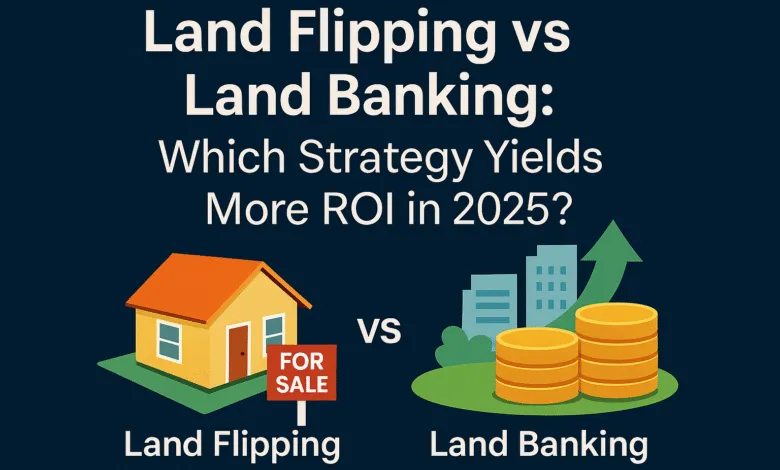Land Flipping vs Land Banking: Which Strategy Yields More ROI in 2025?

In the ever-evolving Nigerian real estate space, land remains one of the most powerful assets for building long-term wealth. However, many investors are caught between two paths — land flipping vs land banking.
Both options are solid. But which one gives you the better return on investment (ROI) in 2025? Let’s break it down.
First, What is Land Flipping?
Land flipping is a short-term investment strategy where you buy land below market value and resell it at a profit, usually within a few months to two years.
It’s a fast-paced, active, and profitable. Think of it as real estate’s version of trading.
Pros of Land Flipping:
- Quick ROI
- Ideal in fast-growing areas
- Can scale with less capital
Cons of Land Flipping:
- Heavily market-timing dependent
- May require active marketing/sales effort
- Prone to price wars in saturated areas
Best for: Opportunistic investors, marketers, and those with sharp negotiation skills.
On the Other Hand, What is Land Banking?
In contrast, land banking is the long game. You buy land in a developing area and hold it, sometimes for 5 to 10 years, allowing its value to appreciate as infrastructure and demand catch up.
Pros of Land Banking:
- Higher ROI potential over time
- Low maintenance
- Excellent for intergenerational wealth transfer
Cons of Land Banking:
- Ties up capital for longer
- Returns are not immediate
- Requires patience and due diligence
Best for: Visionary investors, long-term planners, and estate builders.
Land Flipping vs Land Banking: A 2025 Market Outlook
Before choosing a strategy, it’s important to consider the current market environment. Now, let’s evaluate the 2025 real estate climate and understand what the market dynamics are. Nigeria’s 2025 land market is influenced by a few key forces:
- Rapid urban sprawl in states like Ogun, Lagos outskirts, Abuja, and Port Harcourt
- Inflation and currency instability, which push people towards land as a hedge
- Government infrastructure plans that are opening up new investment corridors
As a result, flipping works well in fast-developing areas. Meanwhile, banking pays off in places with strong future growth potential.
ROI Comparison: Land Flipping vs Land Banking in Numbers
To clarify things, here’s a simplified example:
| Strategy | Initial Cost | Holding Period | Resale Value | ROI |
| Flipping | ₦1.5M | 1 year | ₦2.2M | ~46% |
| Banking | ₦1.5M | 5 years | ₦5.5M | ~266% |
Clearly, Land flipping vs land banking is a game of speed vs patience. Flipping gives fast returns, while banking rewards long-term vision.
Risks in Land Flipping vs Land Banking
Every investment has risk. In land flipping vs land banking, those risks differ.
- Flipping can be impacted by market saturation, poor marketing, and low demand. While
- Banking: faces challenges, including government repossession, delayed infrastructure, and poor land documentation.
Moreover, it’s crucial to verify titles, conduct due diligence, and work with trusted developers or real estate companies.
Which Strategy Should You Choose?
Ultimately, your choice should depend on your investment goals, risk appetite, and timeline.
- If you want quick profits and can handle fast decision-making, go with flipping. But flip smart.
- If you prefer long-term growth and can wait for results, choose banking, and let time work for you.
Even better, consider diversifying your portfolio with both strategies. That way, you enjoy the best of both worlds. Real estate is not just about buying land; it’s about buying into the future before the rest of the world sees it.
Have you flipped land before, or are you banking on a location’s future? Share your experience! Who knows, it might just help someone make their next big move. Leave a comment telling us which strategy you’d bet your money on.
Still unsure of which strategy fits you? Contact us today for a FREE LAND CONSULTATION! Let our team of experts guide you through the process and make your land purchase stress-free and seamless. Don’t wait—your dream land is just a click away!




